Related Research Articles

Politics of Ghana takes place in a framework of a presidential representative democratic republic, whereby the president of Ghana is both head of state and head of government, and of a two party system. The seat of government is at Golden Jubilee House. Executive power is exercised by the government. Legislative power is vested in both the government and Parliament. The judiciary is independent of the executive and the legislature.

The National Democratic Congress (NDC) is a social democratic political party in Ghana, founded by Jerry Rawlings, who was Head of State of Ghana from 1981 to 1993 and the President of Ghana from 1993 to 2001. Following the formation of the Provisional National Defence Council (PNDC), which ruled Ghana following the military coup d'état on 31 December 1981, there was pressure from the international community to restore democracy. The NDC was formed as the ruling party ahead of elections in 1992, in which Rawlings was elected president, and in 1996 Rawlings was re-elected as the NDC candidate. Rawlings' second term ended in 2001.
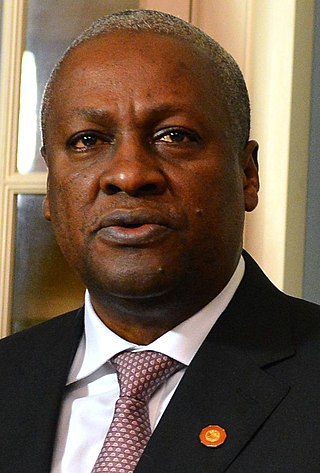
John Dramani Mahama is a Ghanaian politician who served as President of Ghana from 24 July 2012 to 7 January 2017. He previously served as Vice President of Ghana from January 2009 to July 2012, and took office as president on 24 July 2012 following the death of his predecessor, John Evans Fiifi Attah Mills.
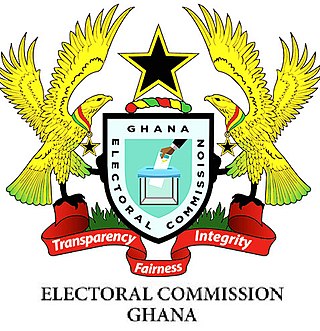
The Electoral Commission of Ghana (EC) is the official body in Ghana responsible for all public elections. Made up of seven members, its independence is guaranteed by the 1992 Ghana constitution. The current commission was established by the Electoral Commission Act (Act 451) of 1993. Kwadwo Afari-Gyan was the first substantive chairman of the commission, from 1993 to 2015. He was succeeded by Charlotte Osei as the first female chairman of the commission from 2015 to June 2018. Jean Adukwei Mensah succeeded Charlotte Osei in July 2018. On December 5, 2018, the Electoral commission chaired by Jean Adukwei Mensah reverted to the old logo showing the Coat of arms of Ghana and a ballot box showing the hand casting its votes, after the controversy over the new logo.
Kwadwo Afari-Gyan is a Ghanaian academic, political scientist and election administrator. He was Chairman of the Electoral Commission of Ghana from 1993 to 2015.
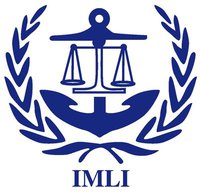
The IMO International Maritime Law Institute (IMLI) was established in 1988 under the auspices of the International Maritime Organization, a specialized agency of the United Nations. Its mission is to train specialists in maritime law. The Institute is currently headquartered in Malta, on the campus of the University of Malta.
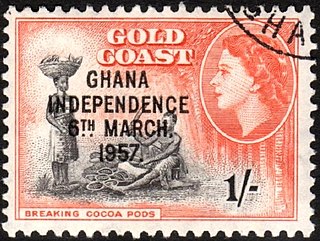
Ghana gained independence from the British on 6 March 1957. It is a member of the Commonwealth of Nations. The country became a republic on July 1, 1960.
Paul Victor ObengKSG also known as P. V. Obeng was a Ghanaian mechanical engineer and politician. He was the chairman of the Kwame Nkrumah University of Science and Technology council. In 2010, he was appointed by the President John Atta Mills administration as Chairman of the National Development Planning Commission (NDPC). Until his death, he was the Senior Presidential Adviser at Presidency to President John Dramani Mahama. He served under President's Jerry John Rawlings, John Evans Atta Mills and John Dramani Mahama in different capacities. He was a member and coordinating secretary and chairman of the Committee of Secretaries of the Provisional National Defence Council. He died on 17 May 2014.

Edward Kofi Omane Boamah is a Ghanaian Politician who served as the Minister for Communications and Spokesperson to the President of the Republic of Ghana. Omane Boamah is a member of the National Democratic Congress.
The Ghana Institute of Linguistics, Literacy and Bible Translation (GILLBT) is an organisation involved in literacy, education and development projects in minority language communities in Ghana, as well as Bible translation work.
Kwabena Agyei Agyapong is Ghanaian civil engineer and politician.

Charlotte Kesson-Smith Osei is the UN International Elections Commissioner, a Ghanaian lawyer and former chairperson of the Electoral Commission of Ghana from 2015 until she was dismissed in June 2018 on grounds of financial malfeasance. Her dismissal has been challenged in the Supreme Court of Ghana by two separate writs. She became the first female to serve in the office of the Electoral Commission of Ghana since the independence of Ghana. Before her appointment she was the chairperson of the National Commission for Civic Education. In May 2019, she was appointed by the United Nations to be on a team of international advisors, to assist in managing the 2019 presidential elections in Afghanistan.

Joyce Bawah Mogtari is a Ghanaian lawyer and politician who served as the Deputy Minister of Transport in Ghana. She is currently the special aide to the former president of Ghana, John Dramani Mahama and the flag bearer for the National Democratic Congress (NDC) for the 2020 Ghanaian elections. She is an experienced mediator and has done this on several occasions, both locally and internationally.
Joseph Akanjolenur Whittal is a Ghanaian who is the Commissioner of Human Rights and Administrative Justice of Ghana since December 2016.
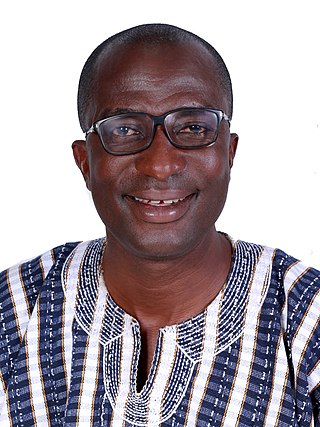
Andrew Asiamah Amoako is a Ghanaian lawyer, politician and member of the Eighth Parliament of the Fourth Republic of Ghana, elected to office in December 2020 as an independent candidate. He currently represents the Fomena Constituency in the Ashanti Region. He is also the Second Deputy Speaker of Parliament.
Akenten Appiah-Menka was a Ghanaian lawyer, politician and businessman. He was the deputy minister for trade and industry and later deputy attorney general in the second republic.
Josephine Nkrumah is a Ghanaian lawyer who currently serves as the chairperson of the National Commission for Civic Education in Ghana.

The presidency of John Mahama began on 24 July 2012 and ended on 7 January 2017. John became the 4th President of the Ghanaian Fourth Republic after he succeeded John Atta Mills who died in office on 24 July 2012. Prior to that, he served as Vice-President of Ghana from January 2009 to July 2012.
Said Sinare is a Ghanaian diplomat and politician, who is a member of the National Democratic Congress (NDC). He is currently a National Vice Chairman of the party. He is a former member of parliament for Ayawaso Central Constituency. He is also a former Ambassador to Saudi Arabia and Egypt. Sinare is an investigator and the founder of Zongo for NDC, a group to help advocate to Muslims and period within the Zongos in Ghana.
Sylvia Annoh is a Ghanaian diplomat and public servant. She was appointed Ghana's ambassador to Denmark in March 2021. Prior to her appointment, she was the spokesperson for the Electoral Commission of Ghana from 1993 to 2015.
References
- ↑ "What does NCCE stand for?". acronymfinder.com. Retrieved 4 March 2014.
- 1 2 "Functions of the NCCE". nccegh.org. Retrieved 3 March 2014.
- ↑ "NCCE". judicial.gov.gh. Archived from the original on 11 May 2014. Retrieved 3 March 2014.
- 1 2 "NATIONAL COMMISSION FOR CIVIC EDUCATION ACT". ghanalegal.com/. Retrieved 3 March 2014.
- ↑ Article 235(1) of the 1992 Constitution of Ghana. The Constitution of Ghana. Ghana Publishers. p. 136.
{{cite book}}: CS1 maint: numeric names: authors list (link) - ↑ Article 235(2) of the 1992 Constitution of Ghana (1992). The Constitution of Ghana. Ghana Publishers. p. 136.
{{cite book}}: CS1 maint: numeric names: authors list (link) - ↑ "Strategic overview of the NCCE" (PDF). mofep.gov.gh. Retrieved 4 March 2014.
- ↑ "Constitution of the Republic of Ghana". ghanaweb.com. Retrieved 5 March 2014.
- ↑ "NCCE launches revitalise civic website". vibeghana.com. Retrieved 4 March 2014.
- ↑ "NCCE works on national cohesion, stability". graphic.com.gh. Retrieved 5 March 2014.
- ↑ "Impact". GILLBT. 16 March 2012. Retrieved 3 March 2014.
- ↑ "European Union supports NCCE with €1 million grant". Graphic Online. Retrieved 2020-11-28.
- ↑ "COMMISSION MEM". Official website. National Commission for Civic Education. Retrieved 17 July 2018.
- ↑ "Mahama appoints Joseph and Josephine as CHRAJ, NCCE bosses". MyJoyOnline. Joy News. Retrieved 17 July 2018.
- ↑ "Chairman of National Commission for Civic Education is dead". gbcghana.com. Archived from the original on 4 March 2014. Retrieved 4 March 2014.
- ↑ "NCCE boss named EC Chairperson". Graphic Online. Retrieved 2020-11-20.